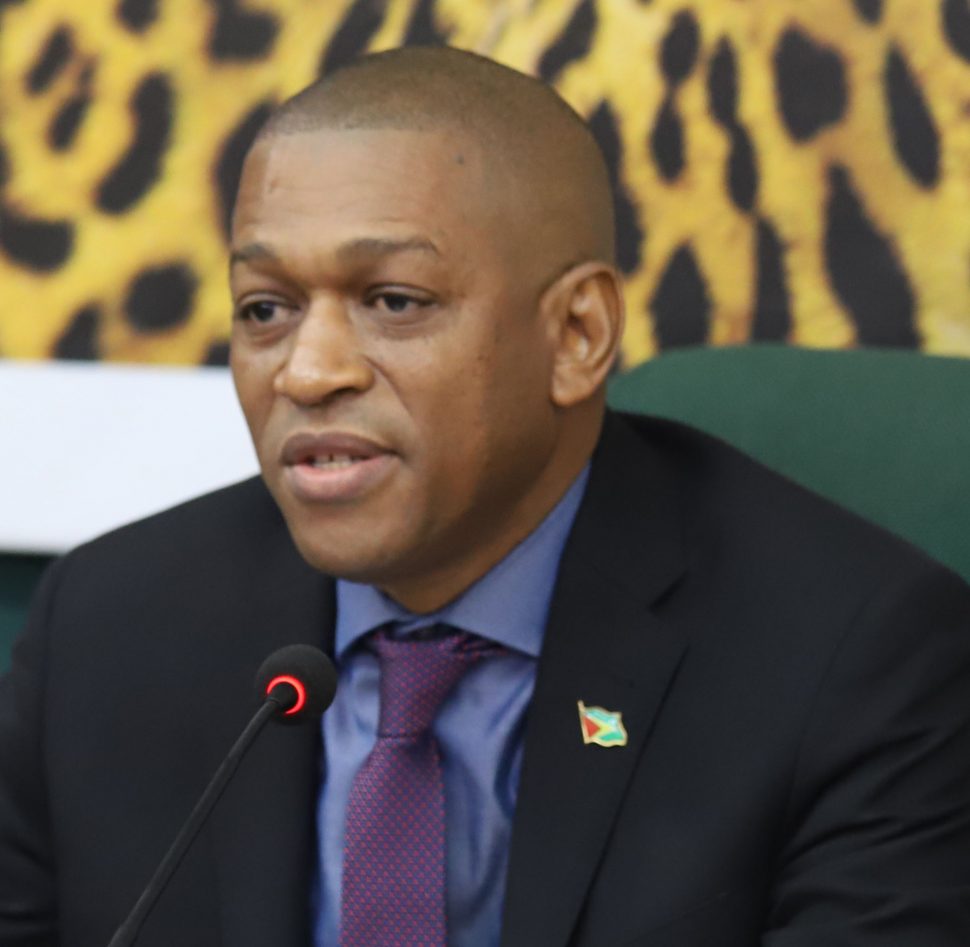United Kingdom-headquartered Information Handling Services (IHS) Markit has been hired by government to undertake the auditing of ExxonMobil’s pre-contract charges and last week began working alongside the Guyana Revenue Authority (GRA).
The work programme is expected to last four months and will cost US$300,000 but government has not decided if the findings will be made public.
“The contract for the firm to complete the cost recovery audit for the historical costs of US$460 million was signed. The contract was awarded to IHS Markit and the company has commenced its work with an in-country visit on December 9 – 11, 2019,” Director of the Department of Energy (DE) Dr Mark Bynoe announced at a news conference on Monday.
Bynoe added that the DE and the Guyana Geology and Mines Commission (GGMC) will be working along closely with the GRA on this project. He also said the DE has secured legal expertise to assist the audit process.
When asked later if the report would be made public at the conclusion of the audit, Bynoe said a decision had not yet been made.
GRA Commissioner-General Godfrey Statia explained that representatives chosen from his agency will “mirror the audit team from IHS Markit in both technical, legal and audit skills,” while GGMC’s Commissioner Newell Dennison assured that “ample and qualified officers” will be represented not only on the audit team but will also be onboard the Floating Production, Storage and Offloading (FPSO) vessel as production begins. “This is a collaboration and the GGMC intends to play its part on the technical side as part of the team that will be dealing with operations onboard the FPSO. We will have an officer on the rig,” he said.
The Production Sharing Agreement (PSA) between Guyana and Exxon affiliate Esso Exploration and Production Guyana Limited (EEPGL) and its co-venturers states that the pre-contract cost “shall include four hundred and sixty million, two hundred and thirty-seven hundred thousand and nine hundred and eighteen United States Dollars (US$460,237,918) in respect of all such costs incurred under the 1999 Petroleum Agreement prior to the year ended 2015.”
Bynoe had last year said that this country lacks the capacity to audit pre-contract costs for oil recovery and had revealed that an international firm would be hired to aid both the GRA and the state audit office to discharge their obligations.
It was his belief that Guyana cannot yet undertake its own audits in that particular area due to lack of capacity and as a result made the move to procure international services to assist local agencies with the transfer of oil and gas content knowledge.
“While both the Guyana Revenue Authority and the Office of the Auditor General have some capacity to conduct the first cost recovery audit of ExxonMobil, they tend to have limited subject expertise. In this vein, therefore, the department is working to procure the services of a reputable international firm that can assist these entities in conducting said audits,” he had said in September last year.
Following calls for ExxonMobil’s US$460 million pre-contract charges to be audited, the GRA last year announced that it will not only audit the costs up to the end of 2015 but the 2016 and 2017 cost recovery charges that are believed to be over US$500 million.
Earlier this year, IHS Markit submitted an expression of interest to undertake the auditing while working with the GRA.
Ability
There has been much debate about the ability of local agencies to undertake such audits. This has seen civil society activist and Chartered Accountant Christopher Ram issuing sharp criticisms of their lack of capacity and in the case of the GRA, its lack of legal authority.
At the same time, accounting experts, such as US-based Chartered Accountant and Professor Floyd Haynes, have underscored the technical nature of such audits and the need for a “multi-disciplinary” auditing team to be used.
“A cost recovery audit… is designed to determine the validity, accuracy and legitimacy of claimed costs, and should be undertaken by a multi-disciplinary team with varying expertise to include legal, finance and accounting, petroleum engineers and as well as others,” Haynes said last year. “Pre-contract costs in the oil exploration business typically fall into two general categories – Finding Costs—cost of geological and geophysical work, cost of licences, signature bonuses, cost of drilling and exploration—and Development Costs—cost of acquiring, constructing, installing production facilities and drilling development wells. Auditing of these costs is indeed a non-trivial matter. Establishing the veracity of some elements of these costs may be straightforward; however, establishing the same for other cost elements can be very complex and could require Subject Matter Experts in areas outside those that [are] required in a traditional financial audit,” he added.
Meanwhile, Bynoe also announced on Monday that a tender for an international oil and gas law firm to revise, replace or develop legislation for Guyana’s Oil and Gas Sector is almost complete and the agency was currently in the contract negotiation stage, which it hopes to complete by next week.
He also noted that the agency has put systems in place for the “effective administration of the sector through both contract management and setting a framework in place for the future.”
“For example, apart from recruiting a contract management specialist, the DE, with assistance from the IDB [Inter-American Development Bank], has completed a PSA process mapping manual, which it will then launch via an electronic platform for easier application and implementation,” he said.
“With the assistance of the IDB, it has also completed its Functions Manual, Organisational structure, and budget. The DE is building out its structure with a number of new hires (15) since moving to its new location in Brickdam, Georgetown. Nine of these were technical and six administrative. Deepening our engagement on gas to shore possibilities, with the projection of gas being able to land on-shore by 2023/24,” he added.






